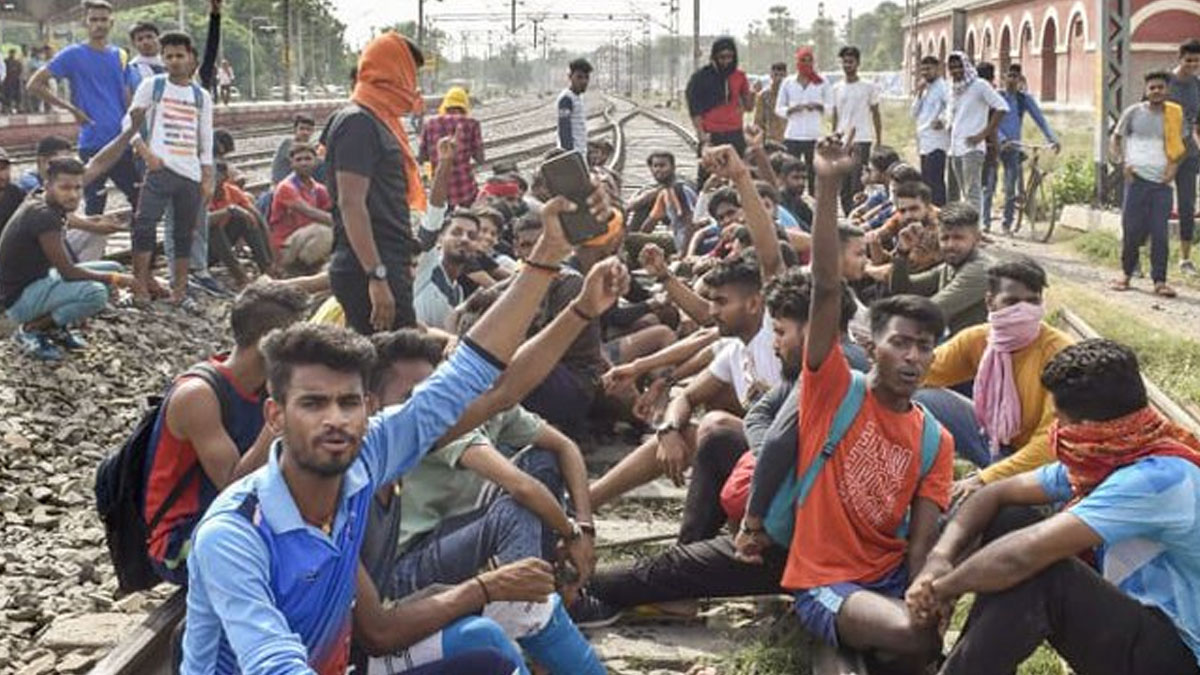Across the country, the youth have hit the streets following Defence Minister Rajnath Singh’s announcement of the Agnipath scheme for short-term contractual appointments to the armed forces. The developments remind us of the Freedom Struggle. Before Independence, the freedom fighters used to uproot railway tracks and set train coaches on fire. Today even as the government celebrates Azadi Ka Amrit Mahotasav, our youth are torching national assets. This is wrong and the youth should not do it. But we also need to ponder as to why such a situation has arisen.
The Agnipath scheme, announced by the Central Government, suffers from several deficiencies. As a retired member of the security forces I can say that this is not the right time for implementing such a scheme. Recruitments to the armed forces have been on hold for the past two to three years. The youth were already stressed. Even during the recent tense pandemic years, they continued with their preparations, hoping that once the recruitment process resumed, they would get an opportunity to serve in the armed forces. Now, however, the government is telling them that under the Agnipath scheme they will have assured employment for only four years. This has incensed them. The government is squarely to be blamed for this situation.
The government has been listing the benefits of the scheme. But what one can see is the scheme taking corruption in the armed forces to new heights. That is because under the scheme, only 25 per cent of the Agniveers will be given permanent positions and the remaining 75 per cent will be sent back home. Now, who would not like to have a permanent job? This will create cut-throat competition between the recruits and will inaugurate a new era of sycophancy. The Agniveers will get Rs 11.70 lakh at the time of their retirement. However, the agents promising permanent jobs will extort much more from them.
The biggest issue with Agnipath is that it provides for only six-month training for the recruits. On the basis of my experience I can say that a longer training course is prescribed even for recruits to the central paramilitary forces. How is it possible to fashion a well-trained soldier in just six months? Soldiers in the army are not to be trained in using lathis and firing tear gas shells. They are to be trained in the use of sophisticated weapons. Can it be done in six months? If not, how will ill-trained youth guard our borders? Even more importantly, won’t the government be putting the lives of these youngsters at risk by sending them to the front lines without equipping them with the necessary skills?
High morale is a prerequisite for any army. It is said that more than weapons, grit and gumption bring about success in wars. A soldier who has an uncertain future ahead of him, a soldier who doesn’t know what he will do after four years – how can we expect him to have a high morale? Some top military generals are praising this scheme just to remain in the good books of the government. There is no doubt that this scheme will have disastrous consequences.

Some are defending Agnipath on the ground that similar schemes are in force in other nations. I believe that the outlook of the people of different countries are different and so are their climate, geography, economic condition and history. We cannot ape other nations. Moreover, India, spread from Kashmir to Kanyakumari and from Goa to Assam, has a greater geographical expanse than most nations it is being compared with. The government should understand this fact.
In my view the biggest issue is finding gainful employment for 75 per cent Agniveers after they retire. If they don’t get employment, they won’t keep quiet. They may kick up a major row, which will also affect those who continue in the armed forces. This may have an adverse impact on the country’s internal security. Secessionist forces may also try to lure this large body of unemployed young, fit and trained youth into their fold.
Prime Minister Narendra Modi wanted to benefit the farmers by promulgating the three farm laws. Apparently, he wants to do some good to the armed forces by implementing this new scheme. But we all know how the farm laws would have hurt the interests of the cultivators. The three farm laws were probably aimed at freeing the government from the responsibility of purchasing farm produce at Maximum Support Price (MSP). Similarly, the Agnipath scheme is aimed at easing the government burden on paying salaries and pension bills. We should recall the words of Chaudhary Chhotu Ram. He had said, “The governments should not think like a Bania. Governance is not like running a shop. The first objective of any government should be the welfare of the masses.” However, this BJP-led government has been behaving like a trader from the get-go.
What is surprising is that most of the retired army officers are silent on this issue. The serving ones, of course, are toeing the government line. This is very sad. Military leaders turning sycophants puts the nation’s security in peril. It is high time the government woke up. It should not play with the future of the youth.
(Translation: Amrish Herdenia; copy-editing: Anil)
Forward Press also publishes books on Bahujan issues. Forward Press Books sheds light on the widespread problems as well as the finer aspects of Bahujan (Dalit, OBC, Adivasi, Nomadic, Pasmanda) society, culture, literature and politics. Contact us for a list of FP Books’ titles and to order. Mobile: +917827427311, Email: info@forwardmagazine.in)
The titles from Forward Press Books are also available on Kindle and these e-books cost less than their print versions. Browse and buy:
The Case for Bahujan Literature
Dalit Panthers: An Authoritative History







